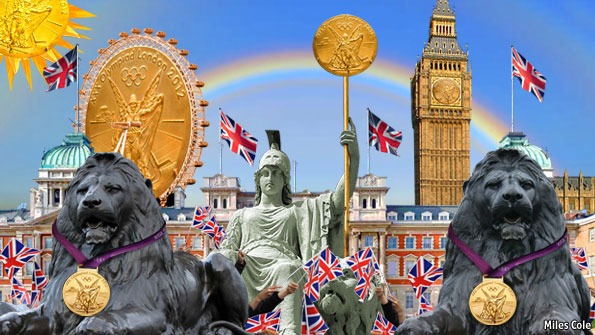Glory and hope
London’s unexpectedly golden Olympics may not permanently change Britain. So what?

The Economist | August 11th 2012
TWO topics have dominated British conversation this summer. The first is water, of which, for a while, there was both too much and too little. In a conjunction surreal enough to inspire disbelieving exchanges between strangers, the country was afflicted by both floods and—would you credit it?—a drought-induced ban on householders using hoses. This paradox united several of the nation’s favourite themes: the absurd caprices of bureaucracy; a sense that Britain somehow manages to cock things up that other countries do not; and rain.
The other main subject has been the Olympic games. Many Britons expected the event to combine the same elements: bungling bureaucracy; national humiliation; rain. The expectation grew stronger in the week before the games began, with a debacle in the provision of security staff and the threat of long queues to get through border controls. Even after the quirky but widely praised opening ceremony, with its cameo by the queen, the doom- and naysaying continued, augmented by the early lack of success for British athletes. The Germans have Schadenfreude; English needs a word that means “to revel in one’s own failure”.
Then something odd happened: Britain started winning. Not just in the so-called “sitting-down sports” in which it often succeeds, and in which, cycling aside, the team tends to be toff-heavy (surely only in Britain is the class and educational background of medallists so exhaustively scrutinised); nor merely in the sort of obscure disciplines in which, for two weeks every four years, millions are fleetingly interested. Brits won the heptathlon and the 10,000 metres. Andy Murray even won the tennis.
And it wasn’t only the sports. The Olympics worked. Drafting in the army after the security-staffing fiasco has reinforced its reputation as the country’s most competent outfit, at least when it comes to domestic mishaps. The transport system held up. Most of all, both the new venues and, especially, the converted ones—archery at Lord’s Cricket Ground; manic beach volleyball in Horse Guards Parade—vindicated the decision to award the games to London. The city scrubbed up nicely.
Weirder things followed. Even at the best of times, Britons tend to be uncomfortable with patriotism, finding it hard to disentangle from nationalism and xenophobia. And these are not the best of times, with a double-dipping economy, misbehaving banks and a rancorous coalition government. The pride the country does take tends to be in plucky defeat (the unofficial anthem of England’s football team is the theme tune from “The Great Escape”), a sort of fatalistic stoicism that risks becoming self-fulfilling. During the Olympics, Britain found it could do pride straight. After an early worry about seeming to be too partisan (another issue unlikely to crop up in, say, the United States) the country crescendoed, like a table of diners singing “happy birthday” in a crowded restaurant.
As a result, a generally atomised, sometimes fractious place seemed to cohere. Londoners typically find solidarity only in suffering or inconvenience: through Tube strikes, terrorist scares or the weather. During the Olympics people discussed medal prospects and thanked the games volunteers and the obliging soldiers. It wasn’t a coercive togetherness, like that after the death of Princess Diana, but warm, organic and widespread.
The Olympics are globalised and parochial at the same time. The countries of the world come, each with its heroes (the Saudi judoka, the rower from Niger) and specialisms (Hungarian swimmers, Kazakh weightlifters). Television viewers wonder what “clean and jerk” is in Chinese. At the same time, the focus is on the host, including the focus of the hosts themselves. Britain looked at itself, and liked what it saw.
Will any of it last? Jessica Ennis, the victorious, mixed-race heptathlete, and Mo Farah, the long-distance champion and Muslim who arrived from Somalia as a child (and who prayed on the track after he won the 10,000 metres) may have some therapeutic influence on attitudes to race and immigration. Mr Farah, in particular, may burnish the image of British Somalis, the country’s most deprived and marginalised immigrant group. Relatively undignified as it is, football offers grounds for hope here: beloved black footballers have probably done more for race relations in Britain than many decrees and activists. But this sort of change is gradual. It will be surprising if immigration is not still a big concern in the next general-election campaign.
Once in a lifetime
Other after-effects may be equally hard to pin down. David Cameron and his coalition government are unlikely to experience a bounce. If the wider economy sees a return for the £9 billion ($14 billion) spent on the games, it is likely to come only in the usefully unverifiable form of a general image reboot. The regeneration of east London may stutter; the graceful velodrome may soon be fodder for lazy allusions to “Ozymandias”. As for the wider psychic effects that some excitable commentators anticipate—a surge of communal endeavour; a transfusion of world-beating grit to British industry; an understanding among youngsters that success comes from hard work, rather than through reality TV—believe it when, and if, you see it.
And, like people going sheepishly back to work after a boisterous office party, perhaps most Britons will soon eschew the rewards of pride for the safer pleasures of self-deprecation, and refrain from talking to strangers, except about the rain. But so what? Debates about the legacy of the games can seem a little beside the point—rather like arguments about whether this sublunary life has any meaning if there isn’t another one after it. Longevity is not the only measure of value: Usain Bolt won the 100 metres in under ten seconds, but those seconds were quite exciting. The life of a country, like a person’s, is made up of moments, and the golden ones can be cherished even if they change nothing.
Category: Bagehot columns on politics